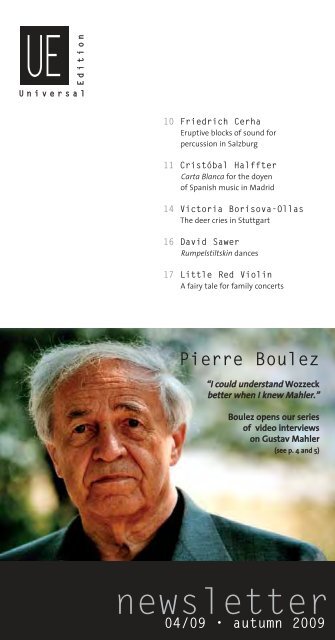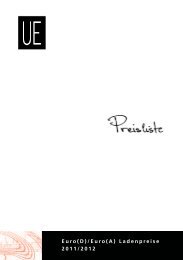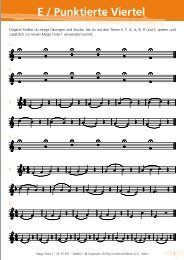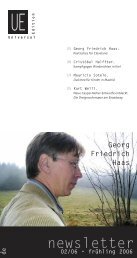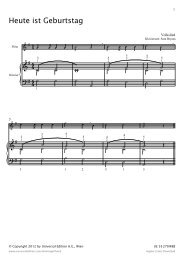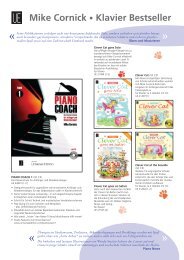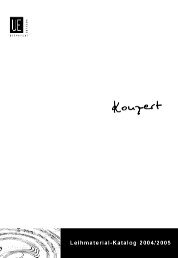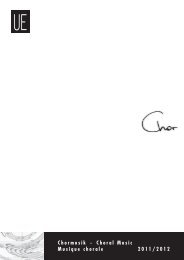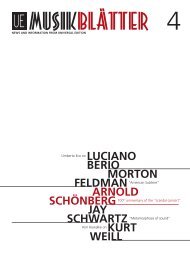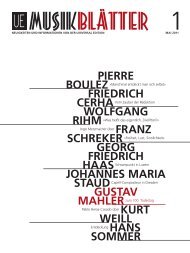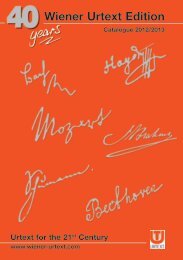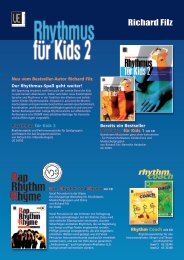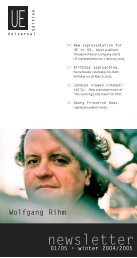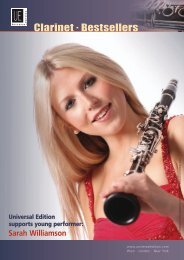Download a pdf of the UE newsletter. - Universal Edition
Download a pdf of the UE newsletter. - Universal Edition
Download a pdf of the UE newsletter. - Universal Edition
Create successful ePaper yourself
Turn your PDF publications into a flip-book with our unique Google optimized e-Paper software.
10 Friedrich Cerha<br />
Eruptive blocks <strong>of</strong> sound for<br />
percussion in Salzburg<br />
11 Cristóbal Halffter<br />
Carta Blanca for <strong>the</strong> doyen<br />
<strong>of</strong> Spanish music in Madrid<br />
14 Victoria Borisova-Ollas<br />
The deer cries in Stuttgart<br />
16 David Sawer<br />
Rumpelstiltskin dances<br />
17 Little Red Violin<br />
A fairy tale for family concerts<br />
Pierre Boulez<br />
“I could understand Wozzeck<br />
better when I knew Mahler.”<br />
Boulez opens our series<br />
<strong>of</strong> video interviews<br />
on Gustav Mahler<br />
(see p. 4 and 5)<br />
<strong>newsletter</strong><br />
04/09 • autumn 2009
2<br />
Contents<br />
WP = World Première<br />
NEWS<br />
Gustav Mahler:<br />
video interviews — 4<br />
URL-shortener for links — 5<br />
COMPOSERS<br />
Staud — 7<br />
Rihm — 9<br />
Cerha — 10<br />
Halffter — 11<br />
Haas — 13<br />
Sotelo — 13<br />
Borisova-Ollas — 14<br />
Luke Bedford — 14<br />
Pärt — 15<br />
Baltakas — 15<br />
Lentz — 16<br />
Sawer — 16<br />
Dudley / Isserlis — 17<br />
Boulez — 19<br />
Burt — 20<br />
Gurlitt — 20<br />
Birtwistle — 21<br />
Kurtág — 21<br />
Kagel — 22<br />
Stockhausen — 22<br />
Haubenstock-Ramati — 22<br />
Festival d’Automne — 23<br />
Feldman — 23<br />
Berio — 24<br />
Bartók — 25<br />
Kodály — 25<br />
Weill — 27<br />
Martin — 28<br />
Schnittke — 28<br />
Szymanowski — 29<br />
Satie — 29<br />
Webern — 30<br />
Martinů — 30<br />
contents 04/2009
Berg — 31<br />
Zemlinsky — 32<br />
Schreker — 32<br />
Schönberg — 33<br />
Mahler — 34<br />
Haydn — 35<br />
Braunfels — 35<br />
Janáček — 37<br />
ANNIVERSARIES — 38 - 39<br />
WORLD PREMIÈRE — 40 - 41<br />
NEW RELEASES — 42 - 43<br />
NEW ON CD — 44 - 45<br />
WORKLIST<br />
Luke Bedford — 46<br />
ACKNOWLEDGEMENTS — 48<br />
Dear Readers,<br />
delivering a guest performance at<br />
<strong>the</strong> Vienna Konzerthaus on 10 Jun,<br />
<strong>the</strong> Bamberger Symphoniker held<br />
its audience captivated with <strong>the</strong><br />
following programme:<br />
Arnold Schönberg’s Drei Klavierstücke<br />
op. 11, performed by Pierre-<br />
Laurent Aimard and Alban Berg’s<br />
Drei Orchesterstücke op. 6. As a finale,<br />
<strong>the</strong>y performed Béla Bartók’s<br />
Concerto for piano and orchestra<br />
No. 1. The concert was sold out and<br />
highly acclaimed.<br />
So, is this really worth mentioning?<br />
It probably wouldn’t be under ‘normal’<br />
circumstances, but in times<br />
<strong>of</strong> tight budgets, retreating to <strong>the</strong><br />
supposedly safe territory <strong>of</strong> classical<br />
and romantic music may only<br />
bring deceptive success. Audiences<br />
are far more open-minded than is<br />
<strong>of</strong>ten assumed, provided modern<br />
classical works and new music are<br />
presented in a meaningful context<br />
and at a high level. To this end, such<br />
programmes are really no risk at all<br />
– ra<strong>the</strong>r, a strong investment in <strong>the</strong><br />
future.<br />
The Editorial Team<br />
3
4<br />
UNIVERSAL EDITION<br />
Gustav Mahler – video interviews<br />
To celebrate <strong>the</strong> two Mahler anniversaries (150 th birthday in 2010; 100 th<br />
anniversary <strong>of</strong> death in 2011) we have launched our new Mahler blog,<br />
where during <strong>the</strong> next two years we will be publishing interviews with<br />
conductors, orchestra managers and musicologists.<br />
www.universaledition.com/mahler<br />
news<br />
Pierre Boulez<br />
“I could understand Wozzeck better<br />
when I knew Mahler.”<br />
Christoph Eschenbach<br />
“Mahler is certainly <strong>the</strong> greatest<br />
symphonist <strong>of</strong> all time.”<br />
Daniel Barenboim<br />
“I started to conduct Mahler out <strong>of</strong><br />
spite.”<br />
Daniele Gatti<br />
“For conductors Mahler seems to<br />
be to be <strong>the</strong> most personal composer”<br />
Michael Tilson Thomas<br />
"I divide my life into before and<br />
after having heard Mahler for <strong>the</strong><br />
first time."
UNIVERSAL EDITION<br />
URL-shortener<br />
for links<br />
We’re now using www.bit.ly. You<br />
asked for additional links in our<br />
articles so we’re now using a URLshortener,<br />
enabling us to include<br />
even more <strong>of</strong> <strong>the</strong>m. Wherever you<br />
see something like www.bit.ly/<br />
composers, just type it into your<br />
browser, and you’ll be redirected to<br />
Franz Welser-Möst<br />
“The specific sound <strong>of</strong> <strong>the</strong> Vienna<br />
Philharmonic Orchestra influenced<br />
him in a big way.”<br />
Jonathan Nott<br />
“You have to give your whole self<br />
when conducting Mahler.”<br />
Kent Nagano<br />
“Mahler expresses life's reality.”<br />
<strong>the</strong> original page, in this case<br />
www.universaledition.com/ truman/en_templates/en_composer.<br />
php3. Saves a bit <strong>of</strong> typing, too …<br />
(We can’t accept responsibility for<br />
third party links.)<br />
news<br />
5
STAUD<br />
Klangspuren<br />
focus<br />
Segue. Music for cello and<br />
WP orchestra by Johannes<br />
Maria Staud was performed<br />
for <strong>the</strong> first time in its revised version<br />
in Berlin on 20 Feb under<br />
Lothar Zagrosek. “Staud creates an<br />
astonishing stylistic rupture, which<br />
practically forces one to listen”<br />
wrote <strong>the</strong> Tagesspiegel on Segue.<br />
The work can now be heard twice<br />
in Austria: <strong>the</strong> Klangspuren Schwaz<br />
perform <strong>the</strong> Austrian première as<br />
<strong>the</strong> start <strong>of</strong> a feature on Staud<br />
(Tirol SO Innsbruck, Anssi Karttunen,<br />
vc, c. Johannes Kalitzke), and<br />
Wien Modern has programmed it<br />
on 13 Nov (RSO Wien, Jean-Guihen<br />
Queyras, vc, c. Bertrand de Billy).<br />
The Klangspuren Festival Schwaz<br />
also features Configurations/Reflet<br />
and A map is not <strong>the</strong> territory<br />
(12 Sep, International Ensemble<br />
Modern Academy, c. Franck Ollu).<br />
The Festival Musica in Strasbourg<br />
performs <strong>the</strong> French première <strong>of</strong><br />
Im Lichte. Music for two pianos and<br />
orchestra (Philharmonisches Orchester<br />
Freiburg, c. Fabrice Bollon,<br />
Tamara Stefanovich, Florent B<strong>of</strong>fard,<br />
pno, 20 Sep). Lagrein can also<br />
be heard <strong>the</strong>re on 30 Sep.<br />
Incipit receives its Dutch première<br />
on 20 Oct in Amsterdam, where<br />
Ensemble Modern perform with<br />
Uwe Dierksen on trombone.<br />
There is a fur<strong>the</strong>r Staud première<br />
this autumn: The revised version <strong>of</strong><br />
One Movement and Five Miniatures<br />
for harpsicord, live electronics<br />
and ensemble is premièred at <strong>the</strong><br />
musikprotokoll in Graz/A on 9 Oct<br />
(Klangforum Wien under Sylvain<br />
Cambreling). The same performance<br />
can be heard again at Wien Modern<br />
on 3 Nov. www.wienmodern.at<br />
Johannes Maria Staud<br />
staud<br />
7
Video still © Yan Proefrock. Festival d'Automne<br />
RIHM<br />
Three women<br />
When Wolfgang Rihm<br />
WP was asked to write a kind<br />
<strong>of</strong> requiem, he decided on<br />
a title – ET LUX – taken from <strong>the</strong><br />
Latin requiem text. The composition<br />
for string quartet and choir<br />
sees its première on 15 Nov at <strong>the</strong><br />
Cologne Philharmonic, where <strong>the</strong><br />
Arditti Quartet and <strong>the</strong> Hilliard Ensemble<br />
perform.<br />
See www.bit.ly/rihm2<br />
This work is a commission by Köln-<br />
Musik, Festival d’Automne in Paris<br />
and Carnegie Hall. It is performed<br />
in Paris on 17 Nov. The British première<br />
is on <strong>the</strong> programme for <strong>the</strong><br />
opening <strong>of</strong> this years’ Huddersfield<br />
Festival on 20 Nov.<br />
Rihm's most recent music-<strong>the</strong>atrical<br />
composition is Drei Frauen<br />
(Three women), which premières<br />
on 25 Sep in Basel (director: Georges<br />
Wolfgang Rihm<br />
Delnon). The work is in three parts:<br />
Aria/Ariadne (2002), Das Gehege<br />
(2006) and Pen<strong>the</strong>silea-Monolog<br />
(2005). Rihm has composed additional<br />
bridge material, and <strong>the</strong> juxtaposition<br />
<strong>of</strong> <strong>the</strong> three gives new<br />
perspectives and insights.<br />
www.bit.ly/rihm3<br />
The French première <strong>of</strong> DEUS PAS-<br />
SUS occurs on 26 Sep at <strong>the</strong> Festival<br />
Musica in Strasburg (SWR RSO<br />
Stuttgart under Jonathan Stockhammer).<br />
Myung-Whun Chung<br />
conducts Das Lesen der Schrift on 18<br />
Sep in Paris (Orchestre Philharmonique<br />
de Radio France). Male<br />
über Male 2 gets its Dutch première<br />
on 22 Oct (Muziekgebouw<br />
aan 't IJ; Asko/Schönberg Ensemble,<br />
conducted by Reinbert de<br />
Leeuw, Jörg Widmann, clarinet).<br />
Jagden und Formen can be heard in<br />
Berlin on 20 Nov at <strong>the</strong> Haus der<br />
Festspiele in its critically acclaimed<br />
stage version by dance company<br />
Sasha Waltz & Guests with Ensemble<br />
Modern under Franck Ollu.<br />
rihm<br />
9
10<br />
CERHA<br />
Impenetrable web<br />
Friedrich Cerha asserts<br />
WP himself with two world<br />
premières this autumn<br />
Instants for grand orchestra “is a sequence<br />
<strong>of</strong> spontaneously created<br />
small elements”, says <strong>the</strong> composer,<br />
“which constantly relates back<br />
to itself in variations, giving rise to<br />
an impenetrable web <strong>of</strong> relationships,<br />
in which – I hope – <strong>the</strong> ‘sweat<br />
<strong>of</strong> <strong>the</strong> labourer’ cannot be heard”.<br />
The work is christened on 20 Nov<br />
by <strong>the</strong> Kölner Philharmonie (WDR<br />
Sinfonieorchester Köln, c. Peter<br />
Rundel). See www.bit.ly/cerha3<br />
Friedrich Cerha<br />
cerha<br />
Cerha wrote his Concerto for Percussion<br />
and Orchestra in 2007/8 for<br />
<strong>the</strong> exceptional young percussionist<br />
Martin Grubinger. The solo part<br />
has a different instrumentation in<br />
each <strong>of</strong> <strong>the</strong> three movements, in<br />
which <strong>the</strong> percussionist changes<br />
position each time, before coming<br />
back to <strong>the</strong> first position for <strong>the</strong><br />
last movement. “Contrary to <strong>the</strong><br />
usual approach, all <strong>the</strong> percussion<br />
instruments – even <strong>the</strong> tom-toms,<br />
temple blocks, woodblocks and<br />
cowbells – are precisely tuned”,<br />
writes <strong>the</strong> composer, “<strong>the</strong> first and<br />
third sections <strong>of</strong> <strong>the</strong> first movement<br />
and <strong>the</strong> end <strong>of</strong> <strong>the</strong> piece are<br />
marked by eruptive blocks <strong>of</strong><br />
sound, dominated by drums”. Ivor<br />
Boton directs <strong>the</strong> Mozarteum Orchester<br />
Salzburg at <strong>the</strong> Salzburg<br />
première on 4 Oct.<br />
www.bit.ly/cerha2<br />
There are three fur<strong>the</strong>r opportunities<br />
to hear works by Cerha in Austria<br />
this autumn: Quellen for ensemble<br />
on 16 Sep at <strong>the</strong> Linzer<br />
Brucknerhaus, 5 Sätze für Klaviertrio<br />
on 23 Sep in Schwaz and Monumentum<br />
für Karl Prantl on 13 Nov<br />
in Vienna – RSO Wien, conducted<br />
by Bertrand de Billy.
Cristóbal Halffter<br />
HALFFTER<br />
Upstanding<br />
resistance<br />
A key part <strong>of</strong> <strong>the</strong> creative<br />
WP business <strong>the</strong>se days is<br />
self-presentation <strong>of</strong> <strong>the</strong><br />
highest possible degree; <strong>the</strong> type<br />
<strong>of</strong> artist who thinks <strong>of</strong> his creative<br />
process as a passion and a duty to<br />
<strong>the</strong> intellect has become rare.<br />
Spanish composer Cristóbal Halffter<br />
has stayed remarkably faithful to<br />
his calling as warning voice for his<br />
country. During Franco's dictatorship<br />
much <strong>of</strong> his artistic inspiration<br />
came about as a result <strong>of</strong> his resistance<br />
to tyranny, but he was always<br />
more than an upstanding musician<br />
<strong>of</strong> <strong>the</strong> resistance. Madrid's Auditorio<br />
and <strong>the</strong> Spanish national orchestra<br />
now honour Halffter with a<br />
Carta Blanca, which gives an<br />
overview <strong>of</strong> <strong>the</strong> multifaceted<br />
creativity <strong>of</strong> <strong>the</strong> doyen <strong>of</strong> Spanish<br />
music in a number <strong>of</strong> concerts. The<br />
high point <strong>of</strong> <strong>the</strong> festival will no<br />
doubt be <strong>the</strong> première <strong>of</strong> De ecos y<br />
sombras for orchestra (13, 14, 15 Nov).<br />
Concierto para violoncelo y orquesta<br />
no. 2 and Preludio para Madrid<br />
’92 can also be heard at <strong>the</strong> same<br />
concert, where <strong>the</strong> composer conducts.<br />
Concierto for piano and orchestra<br />
and Tiento del primer tono<br />
y batalla imperial can also be<br />
heard under Carlos Kalmar, with<br />
soloist Nicolas Hodges (6–8 Nov).<br />
Fur<strong>the</strong>r highlights include a chamber<br />
concert on 11 Nov, featuring<br />
Formantes, Ecos de un antiguo<br />
órgano, El juguete olvidado, Volver<br />
al listado, among o<strong>the</strong>rs. More details<br />
on <strong>the</strong> programme can be<br />
found at www.bit.ly/halffter1<br />
halffter<br />
11
Georg Friedrich Haas and Friedrich Cerha<br />
HAAS<br />
Hommage to<br />
Mendelssohn<br />
The 2009 Mendelssohn<br />
WP Festival will include a<br />
world première <strong>of</strong> Georg<br />
Friedrich Haas’ Traum in des Sommers<br />
Nacht in Leipzig on 28 and 30<br />
Aug. Haas admires Mendelssohn,<br />
particularly when “<strong>the</strong> composition<br />
<strong>of</strong> <strong>the</strong> sound is <strong>the</strong> main part<br />
<strong>of</strong> <strong>the</strong> musical composition”. According<br />
to Haas, “Mendelssohn<br />
forestalled Schönberg’s utopia <strong>of</strong> a<br />
‘sound-colour-melody’. He opened<br />
doors to a room that <strong>the</strong> serial music<br />
<strong>of</strong> <strong>the</strong> 1950s was to enter later.” The<br />
Gewandhaus Orchestra will perform<br />
his new work under Riccardo<br />
Chailly. www.bit.ly/haas1<br />
The Klangspuren Schwaz festival<br />
will include a performance <strong>of</strong> ins<br />
Licht for violin, cello and piano on<br />
23 Sep. Open Spaces II for 12 string<br />
instruments and 2 percussion can<br />
be heard at <strong>the</strong> same festival on 27<br />
Sep with Ensemble Resonanz.<br />
SOTELO<br />
Wailing wind<br />
The Festival de Mùsica de<br />
Alicante is one <strong>of</strong> <strong>the</strong><br />
most important <strong>of</strong> its kind<br />
in Spain. For its 25th anniversary,<br />
<strong>the</strong> festival honours Mauricio Sotelo<br />
with a series <strong>of</strong> performances. The<br />
central part <strong>of</strong> <strong>the</strong> series is <strong>the</strong> première<br />
<strong>of</strong> La mémoire incendiée: la<br />
guitare for string quartet (Diotima<br />
Quartett, 23 Sep), but Sotelo's guitar<br />
concerto Como llora el viento is<br />
also presented for <strong>the</strong> first time in<br />
a chamber version (Grup Instrumental<br />
de Valencia, Canizares, guit,<br />
18 Sep). Alicante also sees <strong>the</strong><br />
Spanish première <strong>of</strong> Chalan.<br />
(musikFabrik, c. Anu Tali, Dirk Rothbrust,<br />
perc, 19 Sep).<br />
www.bit.ly/sotelo2<br />
To mark <strong>the</strong> 25th WP<br />
birthday <strong>of</strong> <strong>the</strong><br />
Klangforum Wien, Sotelo wrote<br />
Klang-Muro-for-Klangforum, which<br />
premières at <strong>the</strong> musikprotokoll in<br />
Graz/A on 9 Oct, and can be heard<br />
again on 3 Nov at <strong>the</strong> Wien Modern:<br />
www.wienmodern.at<br />
haas / sotelo<br />
13
14<br />
BORISOVA-OLLAS<br />
The deer cries<br />
in Stuttgart<br />
Mendelssohn considered<br />
his setting <strong>of</strong> <strong>the</strong> 42nd Psalm to be his best sacred<br />
work. In continuation <strong>of</strong> Mendelssohn’s<br />
200th WP<br />
anniversary celebrations,<br />
<strong>the</strong> Bachakademie Stuttgart<br />
presents a concert <strong>of</strong> Mendelssohn’s<br />
music combined with contemporary<br />
compositions. Hans-Christoph Rademann<br />
conducts <strong>the</strong> RIAS Chamber<br />
Choir Berlin and <strong>the</strong> RSO Berlin<br />
in <strong>the</strong> world première <strong>of</strong> Victoria<br />
Borisova-Ollas’ Psalm 42 (As <strong>the</strong> Deer<br />
Cries) for orchestra, mixed choir<br />
and soloists (commissioned by <strong>the</strong><br />
International Bach Academy Stuttgart).<br />
Caroline Stein and Christ<strong>of</strong><br />
Fischesser are <strong>the</strong> soloists on 13 Sep<br />
in <strong>the</strong> Domkirche St. Eberhard,<br />
Stuttgart. The concert is repeated<br />
two days later at <strong>the</strong> Konzerthaus<br />
in Berlin. See www.bit.ly/borisova1<br />
Victoria Borisova-Ollas<br />
LUKE BEDFORD<br />
Birmingham<br />
commission<br />
Luke Bedford, whose unique,<br />
assured style has won<br />
him many accolades, continues<br />
to be much in demand. The<br />
CBSO Youth Orchestra is <strong>the</strong> latest<br />
ensemble to commission a work<br />
from him: <strong>the</strong>y will be performing<br />
<strong>the</strong> world première <strong>of</strong> his new orchestral<br />
piece, Più Mosso, later this<br />
year, conducted by Thomas Søndergård.<br />
The concert will take place<br />
on 1 Nov, at Birmingham’s Symphony<br />
Hall, where <strong>the</strong>re will also be a chance<br />
to hear Bedford discuss <strong>the</strong> work in<br />
a pre-concert talk with Simon<br />
Webb. See www.bit.ly/bedford1<br />
Bedford continues his fruitful relationship<br />
with <strong>the</strong> London Sinfonietta<br />
with Great Bass Rackett for solo bassoon<br />
commissioned by <strong>the</strong> group in<br />
celebration <strong>of</strong> its 40th WP<br />
birthday.<br />
Details will be announced shortly.<br />
borisova-ollas /<br />
luke bedford
Arvo Pärt<br />
PÄRT<br />
Premières<br />
<strong>of</strong> No. 4<br />
Arvo Pärt’s Symphonie No. 4 ‚Los<br />
Angeles' (dedicated to Mikhail<br />
Khodorkovsky) has already been<br />
performed ten times since it premièred<br />
in January ‘09, and seven<br />
fur<strong>the</strong>r performances are scheduled<br />
for <strong>the</strong> autumn, with premières<br />
in Germany and Latvia (Kremerata<br />
Baltica, T. Kaljuste), Canada<br />
(Toronto Philharmonia, K. Stratton)<br />
and Estonia (Tallinn Chamber Orchestra<br />
& Sinfonietta, E. Klas) and 3<br />
performances in <strong>the</strong> Ne<strong>the</strong>rlands<br />
(Noord Nederlands Orkest, A. Hermus).<br />
As part <strong>of</strong> a CD project, two major<br />
works for choir and orchestra can<br />
be heard at <strong>the</strong> Konzerthaus Berlin<br />
on 14 and 15 Nov: Cantique des degrés<br />
(commissioned by Princess<br />
Caroline for her fa<strong>the</strong>r Prince<br />
Rainier <strong>of</strong> Monaco, 1999) as well as<br />
<strong>the</strong> German première <strong>of</strong> <strong>the</strong> 2008<br />
version <strong>of</strong> Stabat Mater for choir<br />
and string orchestra. K. Järvi will<br />
conduct <strong>the</strong> Rundfunk-Sinfonieorchester<br />
Berlin and Rias<br />
Kammerchor.<br />
BALTAKAS<br />
Urban sound<br />
collage<br />
"He collected sound material, altered<br />
it and pasted it toge<strong>the</strong>r as<br />
an urban music and sound collage,<br />
without any panic and without any<br />
emotional response to <strong>the</strong> social<br />
environment." This is how Achim<br />
Ost descibes Vykintas Baltakas' latest<br />
work, Lift to Dubai, for Ensemble<br />
Modern, composed after his<br />
four week stay in Dubai and premièred<br />
on 27 May in Berlin. It is at<br />
<strong>the</strong> same time a raw and direct, yet<br />
lyrical and warm work. Score and<br />
recording are available for perusal.<br />
pärt / baltakas<br />
15
16<br />
LENTZ<br />
A hundred<br />
million suns<br />
Georges Lentz' new work for orchestra,<br />
Guyuhmgan, was premièred<br />
in Luxembourg this summer.<br />
Contact us for a perusal score<br />
and recording. This September, his<br />
viola concerto, Monh, will be given<br />
its Polish première as part <strong>of</strong> <strong>the</strong><br />
2009 Warsaw Autumn. Antoni Wit<br />
conducts <strong>the</strong> Warsaw Philharmonic<br />
Orchestra (18 Sep); Lawrence<br />
Power is <strong>the</strong> soloist. Lentz gives <strong>the</strong><br />
music a “sense <strong>of</strong> perspective … as<br />
though a barely registered noise<br />
represented <strong>the</strong> collapse <strong>of</strong> a hundred<br />
million suns.” (Sydney Morning<br />
Herald) See www.bit.ly/lentz1<br />
SAWER<br />
A grotesque<br />
fable ...<br />
On 14 Nov <strong>the</strong> world pre-<br />
WP<br />
mière tour <strong>of</strong> Rumpelstiltskin<br />
by David Sawer opens<br />
– with two performances – at <strong>the</strong><br />
CBSO Centre in Birmingham, UK.<br />
David Sawer, Richard Jones (director)<br />
and Stewart Laing (designer)<br />
re-tell <strong>the</strong> familiar Bro<strong>the</strong>rs Grimm<br />
David Sawer<br />
lentz / sawer<br />
tale about greed and come-uppance<br />
in a completely new way,<br />
using dance, action and music<br />
alone. Performed by 6 dancers and<br />
<strong>the</strong> 14 players <strong>of</strong> BCMG (which<br />
commissioned <strong>the</strong> work), conducted<br />
by Martyn Brabbins, Rumpelstiltskin<br />
takes a fresh look at <strong>the</strong><br />
age-old <strong>the</strong>mes <strong>of</strong> transformation,<br />
ritual and revelation. (Four fur<strong>the</strong>r<br />
performances: 20 & 21 Nov,<br />
Tramway, Glasgow; 22 Nov, Bates<br />
Mill, HCMF. See www.bcmg.org.uk)<br />
Prior to <strong>the</strong> BCMG tour comes a<br />
performance <strong>of</strong> Satz by <strong>the</strong> Wiener<br />
Klaviertrio (23 Sep, Schwaz/A) as<br />
well as a performance <strong>of</strong> Between,<br />
for solo harp (1 Oct, Louise T. Blouin<br />
Institute, London).
DUDLEY / ISSERLIS<br />
Music for<br />
family concerts<br />
“Once upon a time <strong>the</strong>re was a<br />
beautiful little violin. She was covered<br />
with deep red varnish and she<br />
was known as Little Red Violin. She<br />
had a lovely tone and played such<br />
sweet music that everybody loved<br />
her, especially her Grandmo<strong>the</strong>r,<br />
Grandmo<strong>the</strong>r Stradivarius …”<br />
These are <strong>the</strong> opening lines <strong>of</strong> our<br />
new work for narrator, solo violin,<br />
solo cello and string orchestra by<br />
Anne Dudley and Steven Isserlis:<br />
Little Red Violin (and <strong>the</strong> Big Bad<br />
Cello) – also available in a version<br />
with piano accompaniment. This<br />
exquisite fairytale, perfect for family<br />
concerts, is an original and witty<br />
variation on <strong>the</strong> Little Red Riding<br />
Hood story.<br />
Anne Dudley and Steven Isserlis<br />
Anne Dudley Steven Isserlis<br />
hardly need any introduction. Dudley,<br />
founding member <strong>of</strong> Art <strong>of</strong><br />
Noise and keyboard player for<br />
Frankie Goes to Hollywood in <strong>the</strong><br />
1980s, is internationally renowned<br />
as a composer <strong>of</strong> music for film<br />
and television, writing for The Crying<br />
Game, Jeeves and Wooster, and<br />
more recently for <strong>the</strong> HBO drama<br />
The Tenth Kingdom. Her soundtrack<br />
for The Full Monty won her an<br />
Oscar in 1998.<br />
Isserlis is known on <strong>the</strong> world’s<br />
concert stages as a first-class ‘cellist.<br />
His recent recording <strong>of</strong> Schumann’s<br />
Music for cello and piano (with<br />
Dénes Várjon) was highly praised<br />
by Gramophone Magazine and<br />
BBC Music magazine.<br />
Little Red Violin is now available for<br />
performance worldwide. Listen to<br />
an excerpt (<strong>of</strong> <strong>the</strong> piano trio) at<br />
www.bit.ly/dudley1 The first ten<br />
pages <strong>of</strong> <strong>the</strong> score are online at<br />
www.bit.ly/dudley2 online.<br />
Also visit www.annedudley.co.uk<br />
and www.stevenisserlis.com<br />
dudley / isserlis<br />
17
BOULEZ<br />
Homage<br />
to <strong>the</strong> master<br />
“Boulez is a joy to listen to” – such<br />
were Igor Stravinsky’s words after<br />
hearing Pierre Boulez’ Le Marteau<br />
sans maître for <strong>the</strong> first time. This<br />
classic piece <strong>of</strong> modern music for<br />
alto and six instruments is just one<br />
item on <strong>the</strong> programme (hr-Ensemble<br />
for New Music, c. Arturo<br />
Tamayo, 21–22 Nov) <strong>of</strong> an extensive<br />
portrait <strong>of</strong> <strong>the</strong> composer, which <strong>the</strong><br />
Alte Oper Frankfurt will be holding<br />
for Boulez at <strong>the</strong> start <strong>of</strong> <strong>the</strong> new<br />
Pierre Boulez<br />
season.<br />
www.alteoper.de,<br />
www.hr-online.de<br />
The programme also includes:<br />
Structures for 2 pianos (with Pierre-<br />
Laurent Aimard, Tamara Stefanovich,<br />
19 Sep); Dérive 1 (c. Gilbert<br />
Varga, 20 Sep); Domaines for clarinet<br />
and orchestra (Junge Deutsche<br />
Philharmonie, c. Susanna Mälkki,<br />
Alain Damiens, clar, 20 Sep); Incises<br />
(Ueli Wiget, pno, 21 Sep); Dérive 2<br />
(Ensemble Modern, c. Franck Ollu,<br />
21 Sep); Messagesquisse for solo<br />
cello and 6 cellos (Ensemble Modern,<br />
Eva Böcker, vcl, 21 Sep); sur Incises<br />
for 3 pianos, 3 harps and 3 percussionists<br />
(Ensemble Modern, c.<br />
Franck Ollu, 27 Sep). Violinist Carolin<br />
Widmann will perform Anthèmes<br />
1 and Anthèmes 2 on 29<br />
Sep.<br />
Rotterdam will also be hosting<br />
some remarkable Boulez performances.<br />
Arie van Beek is to conduct<br />
Doelenensemble on 5 Oct, with Improvisation<br />
I and Improvisation II,<br />
Éclat and Rituel in memoriam<br />
Bruno Maderna. On 23 Nov, Reinbert<br />
de Leeuw will conduct Répons<br />
with Asko|Schönberg Ensemble.<br />
Hae-Sun Kang will perform Anthèmes<br />
2 in Seoul on 24 Oct.<br />
boulez<br />
19
20<br />
BURT<br />
Great loneliness<br />
Francis Burt wrote Unter der<br />
blanken Hacke des Mondes in 1974.<br />
The work, for baritone and orchestra<br />
is based on five poems by <strong>the</strong><br />
poet Peter Huchel, who emigrated<br />
from East Germany in 1972. The<br />
composer was moved by <strong>the</strong> “expression<br />
<strong>of</strong> great loneliness” in <strong>the</strong><br />
text. The Orchester der Kunstuniversität<br />
Graz performs <strong>the</strong> work<br />
under Martin Sieghart on 27 Oct in<br />
<strong>the</strong> Stefaniensaal in Graz/A. The<br />
baritone is David Park.<br />
Francis Burt is currently completing<br />
his full-length opera Mahan.<br />
Francis Burt<br />
GURLITT<br />
The o<strong>the</strong>r<br />
Wozzeck<br />
burt / gurlitt<br />
Several unfortunate circumstances<br />
caused <strong>the</strong> opera Wozzeck by Manfred<br />
Gurlitt, who was born in Berlin<br />
in 1890, to be almost forgotten. The<br />
world première – in Bremen, 1926 –<br />
was preceded by <strong>the</strong> première <strong>of</strong><br />
Alban Berg’s identically-named<br />
opera a year earlier. Without this<br />
overwhelming competition, <strong>the</strong>re<br />
is no doubt that Gurlitt’s scoring<br />
would have won a fixed place in<br />
<strong>the</strong> repertoire as a major contribution<br />
to expressionist music <strong>the</strong>atre.<br />
There are several astonishing parallels<br />
between Berg and Gurlitt’s<br />
works, such as <strong>the</strong> first “Marie”<br />
scene, where both composers employ<br />
a march and a lullaby. In his<br />
Wozzeck, Gurlitt dispensed with<br />
traditional structures, instead aiming<br />
to match Büchner’s text with<br />
his sequences, which <strong>of</strong>ten only<br />
last a few minutes. The Lucerne<br />
Theatre will open its season with<br />
this masterpiece on 6 Sep.<br />
www.bit.ly/gurlitt1
BIRTWISTLE<br />
Successful<br />
celebrations<br />
In honour <strong>of</strong> Harrison Birtwistle’s<br />
birthday, <strong>the</strong> last few months have<br />
seen some exciting programmes <strong>of</strong><br />
his works, including a highly successful<br />
series at Aldeburgh Festival,<br />
and two prestigious concerts at<br />
<strong>the</strong> BBC Proms.<br />
Over <strong>the</strong> autumn, several pieces<br />
are set to feature in performances<br />
across Europe. Silbury Air can be<br />
heard at <strong>the</strong> Amsterdam Concertgebouw,<br />
conducted by Oliver<br />
Knussen (8 Sep). The rhythmically<br />
entrancing, Stravinskian chamber<br />
orchestra work, Carmen Arcadiae<br />
Mechanicae Perpetuum, receives<br />
two outings. The first is at <strong>the</strong><br />
Sacrum Pr<strong>of</strong>anum Festival in<br />
Krakow, with <strong>the</strong> ever-engaging<br />
London Sinfonietta under David<br />
A<strong>the</strong>rton (16 Sep, Museum <strong>of</strong><br />
Urban Engineering); <strong>the</strong> latter will<br />
Harrison Birtwistle<br />
be performed by Alarm Will Sound<br />
(23 Oct, Hamburg, Kampnagel). The<br />
Sinfonietta concert will also include<br />
Cortege, Secret Theatre, and<br />
Ut heremita solus.<br />
KURTÁG<br />
Ghosts on CD<br />
Marino Formenti’s new KAIROS-CD<br />
Kurtág’s Ghosts examines how<br />
some <strong>of</strong> <strong>the</strong> major composers from<br />
<strong>the</strong> 14 th to <strong>the</strong> 20 th century have influenced<br />
György Kurtág. ”If <strong>the</strong><br />
construction <strong>of</strong> this program was a<br />
phenomenal creative act, Formenti<br />
proved no less formidable in <strong>the</strong><br />
execution" (Joshua Kosman, San<br />
Francisco Chronicle www.bit.ly/<br />
kurtag1). Order <strong>the</strong> CD at<br />
www.kairos-music.com<br />
This autumn, <strong>the</strong> Wiener Klaviertrio<br />
performs Varga Bálint Ligaturája<br />
in Schwaz/A (23 Sep).<br />
Heinz Holliger conducts Kurtág’s<br />
Capriccio in Geneva/CH (30 Oct).<br />
birtwistle / kurtág<br />
21
22<br />
KAGEL<br />
Musical match<br />
The sporty-sounding title hints at<br />
<strong>the</strong> fact that Mauricio Kagel’s<br />
Match (1964) for 3 players is a<br />
musical game in which <strong>the</strong> musicians’<br />
movements <strong>of</strong> play become<br />
mimicking actions and <strong>the</strong> percussionist<br />
takes on an umpire-like<br />
role. The piece will be performed<br />
on 4 Oct (Berlin) by Kammerensemble<br />
Neue Musik Berlin and<br />
on 14 Oct (Brussels) by musikFabrik.<br />
Kagel’s MM 51 (1976), film music for<br />
piano (and metronome) can be<br />
heard on 12 Nov at <strong>the</strong> Kasseler<br />
Musiktage festival with Ulrich<br />
Roman Murtfeld at <strong>the</strong> piano.<br />
STOCKHAUSEN<br />
Time and space<br />
Pierre Boulez and Ensemble Intercontemporain<br />
perform Kreuzspiel<br />
and Kontra-Punkte by Karlheinz<br />
Stockhausen at <strong>the</strong> Festival<br />
d'Automne in Paris on 17 Oct.<br />
Kreuzspiel (1951) is written for oboe,<br />
bass clarinet, piano and three percussionists,<br />
and realises <strong>the</strong> idea <strong>of</strong><br />
a crossroads between temporal<br />
and spatial events. The single<br />
movement <strong>of</strong> Kontra-Punkte<br />
(1952/53) for 10 instruments is set<br />
in a multi-faceted sound world<br />
where individual tones and temporal<br />
relationships resolve into one<br />
ano<strong>the</strong>r until only unity can be<br />
heard. www.festival-automne.com<br />
HAUBENSTOCK-RAMATI<br />
Musical<br />
anxieties<br />
Roman Haubenstock-Ramati wrote<br />
Symphonie ‘K’ in 1967, based on<br />
four orchestral fragments from his<br />
opera Amerika. He uses “K” to symbolise<br />
Kafka’s “every man”, as well<br />
as <strong>the</strong> anxieties <strong>of</strong> modern man,<br />
<strong>the</strong> inner conflict <strong>of</strong> <strong>the</strong> individual<br />
and <strong>the</strong> inability to escape <strong>the</strong> alllevelling<br />
machine. The piece can be<br />
heard at <strong>the</strong> Rainy Days festival in<br />
Luxembourg on 28 Nov, with <strong>the</strong><br />
Orchestre Philharmonique de Luxembourg<br />
under Emilio Pomàrico.<br />
More information:<br />
www.philharmonie.lu<br />
kagel / stockhausen /<br />
haubenstock-ramati
Notre Dame de Paris<br />
FESTIVAL D’AUTOMNE<br />
<strong>UE</strong> in Paris<br />
The Paris Festival d’Automne presents<br />
<strong>the</strong> French première <strong>of</strong> Wolfgang<br />
Rihm’s – ET LUX – for four<br />
voices and string quartet, which<br />
takes place on 17 Nov (Hilliard Ensemble/Arditti<br />
Quartet). On 18 Sep<br />
Myung-Whun Chung and <strong>the</strong> Orchestre<br />
Philharmonique de Radio<br />
France perform Rihm’s Das Lesen<br />
der Schrift (The Reading <strong>of</strong> <strong>the</strong><br />
Scripts) – four movements performed<br />
in between <strong>the</strong> movements<br />
<strong>of</strong> Brahms’ Deutsches Requiem.<br />
Rihm comments, “It's as if<br />
<strong>the</strong>re were four monochrome panels<br />
hanging in a Gothic chapel or,<br />
somewhat more colourfully, four<br />
large canvasses by Anselm Kiefer.”<br />
www.bit.ly/istwidmann<br />
Carolin Widmann takes <strong>UE</strong>’s violin<br />
music to Paris, performing Luciano<br />
Berio’s Sequenza VIII, Wolfgang<br />
Rihm’s Über die Linie VII and Morton<br />
Feldman’s For Aaron Copland<br />
(30 Nov).<br />
Emilio Pomàrico and <strong>the</strong> Frankfurt<br />
RSO join her for Feldman’s Violin<br />
and Orchestra (19 Oct).<br />
Full programme and dates:<br />
www.bit.ly/paris1<br />
FELDMAN<br />
Weaving sounds<br />
“Though <strong>the</strong>se fragments [<strong>of</strong> knotted<br />
carpets found in Turkestan]<br />
were too small to indicate ei<strong>the</strong>r its<br />
design or provenance, <strong>the</strong>y did convey<br />
a long tradition <strong>of</strong> carpet weaving.<br />
This is to a large degree <strong>the</strong> extended<br />
metaphor <strong>of</strong> my composition:<br />
not <strong>the</strong> suggestion <strong>of</strong> an actual<br />
completed work <strong>of</strong> ‘art’, but<br />
<strong>the</strong> history in Western music <strong>of</strong><br />
putting sounds and instruments<br />
toge<strong>the</strong>r.” The Turfan Fragments by<br />
Morton Feldman is performed in<br />
Lisbon (12 Sep) and Munich (2 Oct).<br />
See above and www.bit.ly/feldman1<br />
for more performances.<br />
23<br />
festival d’automne /<br />
feldman
24<br />
BERIO<br />
Key work <strong>of</strong> <strong>the</strong><br />
20th century<br />
Luciano Berio’s Sinfonia for eight<br />
voices and orchestra (1968/9) is<br />
one <strong>of</strong> <strong>the</strong> key works <strong>of</strong> 20 th century<br />
musical history. The third movement<br />
is introduced by a collage <strong>of</strong><br />
Mahler's Symphony No. 2, and it is<br />
performed on 7 Sep at <strong>the</strong> Lucerne<br />
Festival Academy as part <strong>of</strong> <strong>the</strong><br />
Festival Forum. Pierre Boulez<br />
directs <strong>the</strong> Lucerne Festival Orchestra;<br />
Ward Swingle leads <strong>the</strong> singers<br />
<strong>of</strong> <strong>the</strong> Lucerne Festival Academy;<br />
Roland Wachter chairs <strong>the</strong> Academy<br />
Forum. Sinfonia is <strong>the</strong>n performed<br />
in full on 10 Sep.<br />
Venezuelan conductor Gustavo<br />
Dudamel has introduced two <strong>of</strong><br />
Berio's works into <strong>the</strong> repertoire <strong>of</strong><br />
<strong>the</strong> two orchestras he now leads as<br />
principal conductor: Folk Songs<br />
with <strong>the</strong> Göteborgs Symfoniker<br />
and mezzo-soprano Malena Ernman<br />
(Go<strong>the</strong>nburg/S, 5 Sep) and<br />
also with <strong>the</strong> Los Angeles Philharmonic<br />
Orchestra and Dawn Upshaw<br />
(Los Angeles, 11–15 Nov). Also<br />
on <strong>the</strong> programme in Los Angeles<br />
is Rendering, a reconstruction <strong>of</strong><br />
Schubert's sketches for his Symphony<br />
No. 10, meticulous and radical<br />
at <strong>the</strong> same time.<br />
Laborintus II for voice, instruments<br />
and recording holds a particular<br />
place in Berio's musical dramatic<br />
berio<br />
Luciano Berio<br />
output. The work can be performed<br />
as a <strong>the</strong>atrical event, as an allegory,<br />
as documentation, as mime, in <strong>the</strong>atres,<br />
in concert halls, on television,<br />
on <strong>the</strong> radio, outdoors, etc. Ensemble<br />
Intercontemporain under Susanna<br />
Mälkki gives a concert performance<br />
<strong>of</strong> <strong>the</strong> work in Paris and<br />
Strasbourg on 20 Sep and 3 Oct.
BARTÓK<br />
London –<br />
Mailand – Paris<br />
ENO introduces a new production<br />
<strong>of</strong> Blubeard’s Castle by Béla Bartók<br />
this season, opening on 6 Nov in<br />
London. Conducted by music director<br />
Edward Gardner and directed<br />
by Daniel Kramer (who won a<br />
South Bank Show Award for his<br />
production <strong>of</strong> Birtwistle’s Punch<br />
and Judy last year), Bartók’s only<br />
opera features Clive Bayley in <strong>the</strong><br />
title role and Michaela Martens as<br />
<strong>the</strong> wife who sacrifices herself for<br />
truth. Also 10, 12, 14, 20, 25 & 28 Nov.<br />
See www.eno.org.uk<br />
Before this, <strong>the</strong> Filarmonica della<br />
Scala and Maurizio Pollini, under<br />
<strong>the</strong> direction <strong>of</strong> Pierre Boulez, undertake<br />
a run <strong>of</strong> concerts in Milan<br />
and Paris, each featuring <strong>the</strong> Piano<br />
Concerto No. 2 and The Miraculous<br />
Mandarin (27, 29, 31 Oct, Teatro alla<br />
Scala, Milan; 16 Nov, Salle Pleyel,<br />
Paris). The day before <strong>the</strong> last concert,<br />
also in Paris, Peter Eötvös conducts<br />
<strong>the</strong> Orchestre Philharmonique<br />
de Radio France in 3 Dorfszenen<br />
(15 Nov).<br />
KODÁLY<br />
Béla Bartók by László Marton, Budapest<br />
Music belongs<br />
to everybody!<br />
Zoltán Kodály’s motto was “music<br />
belongs to everybody!” At <strong>the</strong> start<br />
<strong>of</strong> <strong>the</strong> 20 th century, toge<strong>the</strong>r with<br />
Béla Bartòk, he researched Hungarian<br />
folk music and integrated it<br />
into his own work. In Tänze aus<br />
Galánta (1933), maybe his most<br />
popular work, he uses sound impressions<br />
from Galánta, a Hungarian<br />
village where he spent seven<br />
years <strong>of</strong> his childhood. The piece<br />
will be performed 15 times in Europe<br />
in <strong>the</strong> next few months alone.<br />
Please visit our website for more<br />
information: www.bit.ly/kodaly1<br />
bartók / kodály<br />
25
WEILL<br />
Collected<br />
critical edition<br />
Composers whose legacy – <strong>the</strong>ir<br />
oeuvre – is looked after with dedication,<br />
love and musical expertise<br />
are truly lucky. Kurt Weill is one<br />
such composer, thanks to <strong>the</strong> New<br />
York-based Kurt Weill Foundation<br />
for Music. For decades, <strong>the</strong> foundation<br />
has been ensuring that <strong>the</strong><br />
works by <strong>the</strong> exiled composer (who<br />
found a home from home in <strong>the</strong><br />
USA, where he went on to write a<br />
whole series <strong>of</strong> compositions,<br />
mainly works for stage) are performed<br />
true to <strong>the</strong> scores all over<br />
<strong>the</strong> world. In 1992, <strong>the</strong> foundation<br />
began an epic, long-term undertaking<br />
– to make <strong>the</strong> composer’s<br />
complete works available to practising<br />
musicians and musicologists<br />
in exemplary editions. Although it<br />
Kurt Weill<br />
is almost inconceivable, Weill’s<br />
legacy was only available in print in<br />
flawed editions or not at all after<br />
his death in 1950. Just two <strong>of</strong> his<br />
works for stage were published<br />
posthumously as scores, meaning<br />
that countless major compositions<br />
could not be distributed. The same<br />
applied to his concert music. The<br />
Kurt Weill <strong>Edition</strong> is <strong>the</strong>refore truly<br />
epoch-making, especially since<br />
Weill’s versatile work will call for a<br />
new definition <strong>of</strong> a “collected critical<br />
edition”. Weill’s life’s work is to<br />
be published in four series: for<br />
stage, concert, screen and “various”.<br />
Comprising 24 volumes, <strong>the</strong><br />
first will also be <strong>the</strong> most extensive.<br />
Zaubernacht, Der Protagonist,<br />
The Threepenny Opera and The<br />
Firebrand <strong>of</strong> Florence are already<br />
available. Weill’s complete chamber<br />
music and two impressive volumes<br />
<strong>of</strong> facsimiles have also been<br />
published. More information:<br />
www.kwf.org<br />
weill<br />
27
28<br />
MARTIN<br />
Tempestuous<br />
Sounds<br />
Frank Martin’s Trois Danses, for<br />
oboe, harp, string quintet and<br />
string orchestra, was composed in<br />
1970 for Heinz and Ursula Holliger<br />
(oboe and harp). The work now comes<br />
to Japan for <strong>the</strong> first time. The Kansai<br />
Philharmonic Orchestra is conducted<br />
by Maurice Bourgue in<br />
Osaka on 8 Oct (Hansjörg Schellenberger,<br />
ob, Margit-Anna Süß, hrp).<br />
20 years earlier, Martin concerned<br />
himself with Shakespeare's Tempest.<br />
The first musical result was<br />
<strong>the</strong> Five Songs <strong>of</strong> Ariel, which were<br />
Frank Martin<br />
premièred in 1950. Five years later,<br />
Martin completed his opera Der<br />
Sturm, which still remains a very<br />
valuable interpretation <strong>of</strong> <strong>the</strong><br />
Shakespeare work. The Ariel Songs<br />
will be performed at <strong>the</strong> Prinzregenten<strong>the</strong>ater<br />
in Munich on 3 Oct.<br />
Peter Dijkstra conducts <strong>the</strong> Bavarian<br />
Radio Choir.<br />
SCHNITTKE<br />
Sombre<br />
desperation<br />
Alfred Schnittke's Historia von D.<br />
Johann Fausten (1987/1994) is<br />
based not on Goe<strong>the</strong>'s Faust, but<br />
on <strong>the</strong> popular Faust text <strong>of</strong> <strong>the</strong><br />
16 th century. In his quest for knowledge<br />
Faust makes a pact with <strong>the</strong><br />
devil, who appears in <strong>the</strong> opera as<br />
two separate characters,<br />
Mephistophiles (male soprano)<br />
and Mephistophilia (female contralto).<br />
The desperation <strong>of</strong> <strong>the</strong> title<br />
character is expressed with elements<br />
<strong>of</strong> Bach, Wagner, Mahler and<br />
Shostakovitch in a melancholy,<br />
sometimes almost sparse musical<br />
language. Excerpts <strong>of</strong> <strong>the</strong> opera are<br />
performed by <strong>the</strong> London Philharmonic<br />
Orchestra under Vladimir<br />
Jurowski on 18 Nov (soloists: Anna<br />
Larsson, Marco Lazzare and<br />
Stephen Richardson; Royal Festival<br />
Hall, London, UK première).<br />
www.lpo.org.uk<br />
martin / schnittke
SZYMANOWSKI<br />
Monumental<br />
uncertainty<br />
12 th century King Roger II <strong>of</strong> Sicily's<br />
authority is threatened by <strong>the</strong> arrival<br />
<strong>of</strong> a young shepherd who is converting<br />
<strong>the</strong> inhabitants <strong>of</strong> <strong>the</strong> island<br />
to his pagan ideas. Karol Szymanowski's<br />
1924 opera Król Roger<br />
(King Roger) presents this material<br />
in a monumental, dense and virtuosic<br />
score, and stands as one <strong>of</strong> <strong>the</strong><br />
major operas <strong>of</strong> <strong>the</strong> 20 th century.<br />
Following its première performances<br />
at <strong>the</strong> Bregenz Festival in August,<br />
David Pountney's new production<br />
<strong>of</strong> Król Roger (stage design:<br />
Raimund Bauer) now comes to <strong>the</strong><br />
Liceu in Barcelona for eight performances,<br />
conducted by Josep<br />
Pons.<br />
Pons joins <strong>the</strong> Symphony Orchestra<br />
and Chorus <strong>of</strong> <strong>the</strong> Liceu on 15 Nov<br />
for a Szymanowski concert including<br />
his Stabat Mater and Symphonie<br />
No. 3. www.bit.ly/liceu1<br />
SATIE<br />
Stage set:<br />
Pablo Picasso<br />
Three works by Eric Satie, a great<br />
original composer, are scheduled for<br />
performances. 1926 saw <strong>the</strong> world<br />
première <strong>of</strong> Satie’s ballet Mercure.<br />
Poses plastiques (choreographer:<br />
Léonide Massines; stage set and<br />
costumes: Pablo Picasso). The ballet<br />
was commissioned by <strong>the</strong> Count<br />
de Beaumont, who wanted to use<br />
<strong>the</strong> exclusive cast to compete with<br />
Diaghilev’s Ballets russes. The piece<br />
will be performed in Rouen/F on 19<br />
Nov under Johannes Debus. In<br />
1928, Roger Desormière arranged<br />
Satie’s Geneviève de Brabant, a<br />
pièce en vers et en prose, which will<br />
be presented by “Die Oper im<br />
Knopfloch” on 17 Oct in Oberengstringen/CH.<br />
The same year,<br />
Darius Milhaud orchestrated Jack<br />
in <strong>the</strong> Box, Satie’s pantomime ballet<br />
for piano. The 3-movement<br />
work lasts 6 minutes and can be<br />
heard on 18 Oct in Reutlingen/D.<br />
Eric Satie<br />
szymanowski / satie<br />
29
30<br />
WEBERN<br />
Concentrated<br />
expression<br />
Anton Webern’s Passacaglia op. 1<br />
for orchestra, which he composed<br />
as a tonal piece as late as 1908, already<br />
carries <strong>the</strong> hallmarks <strong>of</strong> his<br />
later style. The piece marks <strong>the</strong><br />
starting point for Webern’s characteristic<br />
musical language, which<br />
became increasingly marked by<br />
highly concentrated expression on<br />
all levels between loud and s<strong>of</strong>t,<br />
coupled with an aphoristic form.<br />
Zubin Mehta and <strong>the</strong> Vienna Philharmonic<br />
will be presenting Pas-<br />
Zubin Mehta<br />
sacaglia twice: on 3 Sep at <strong>the</strong><br />
Wolkenturm Grafenegg/A – where<br />
it will be combined with 6 Stücke<br />
op. 6 (1909) – and on 6 Oct at <strong>the</strong><br />
Vienna Musikverein. Mehta is to<br />
perform 6 Stücke, in which Webern<br />
uses <strong>the</strong> instruments according to<br />
Schönberg’s sound-colour-melody<br />
concept, with Staatskapelle Berlin<br />
in Berlin (Philharmonie, 26 Nov and<br />
Konzerthaus, 30 Nov).<br />
MARTINU<br />
Fantastical<br />
developments<br />
Bohuslav Martinů‘s The Epic <strong>of</strong> Gilgamesh<br />
is based on <strong>the</strong> Assyrian-<br />
Babylonian poem <strong>of</strong> <strong>the</strong> same<br />
name, and <strong>the</strong> colossal power <strong>of</strong><br />
<strong>the</strong> source material – wrestling<br />
with forces <strong>of</strong> nature, social power<br />
struggles, sexuality, love and death<br />
– inspired Martinů to tremendous<br />
vocal creativity. There are lyrical<br />
and dramatic elements, meditative<br />
sections and sections based on archaic<br />
motifs – all <strong>of</strong> which provide<br />
fertile ground for fantastical developments.<br />
This oratorio can soon be<br />
experienced in Prague and Basel:<br />
National Theatre Prag, 10 Sep, Orchestra<br />
and Choir <strong>of</strong> <strong>the</strong> National<br />
Theatre, c. Tomás Netopil; Basler<br />
Martinskirche, 20 and 21 Nov, Basel<br />
Sinfonietta and Bach Chor Basel,<br />
c. Joachim Krause.<br />
webern / martinu
Alban Berg Wozzeck Opéra Bastille Paris 2008<br />
BERG<br />
Berg for<br />
any stage<br />
It goes without saying that <strong>the</strong><br />
work <strong>of</strong> Alban Berg is a fixture in<br />
<strong>the</strong> international concert and<br />
opera repertoire. However, <strong>the</strong> fact<br />
that <strong>the</strong>re are, for example, four<br />
versions <strong>of</strong> Wozzeck, <strong>of</strong> which two<br />
have been written in <strong>the</strong> last few<br />
years, demonstrates <strong>the</strong> undiminished<br />
power and influence <strong>of</strong> this<br />
masterpiece. The reduced version<br />
by Erwin Stein, which was completed<br />
in Berg's lifetime, made it<br />
possible for smaller <strong>the</strong>atres to<br />
stage <strong>the</strong> work. Almost seven<br />
decades later (1995), John Rea fulfilled<br />
<strong>the</strong> need for a chamber version,<br />
which made <strong>the</strong> piece even<br />
more widely accessible. The composer<br />
Eberhard Kloke had <strong>the</strong><br />
same goal in mind when he pro-<br />
duced a new version in 2004, with<br />
an orchestra slightly larger than<br />
Rea's but slightly smaller than<br />
Stein's. Koblenz has decided on<br />
Rea, Gera on Kloke, while Berg's<br />
original version is performed in<br />
Paris. The same is true <strong>of</strong> Lulu. Theatres<br />
can decide on Berg's unfinished<br />
version, or on <strong>the</strong> three-act<br />
opera completed by Friedrich<br />
Cerha (coming up in Japan and<br />
Madrid).<br />
The Lyrical Suite <strong>of</strong>fers similar options,<br />
has <strong>the</strong> same issues, since<br />
Dutch composer Theo Verbey<br />
arranged <strong>the</strong> movements No. 1, 5<br />
and 6 for string orchestra, expanding<br />
on Berg's incomplete sketches.<br />
This new orchestration is beginning<br />
to make its mark – although<br />
<strong>the</strong> upcoming performance with<br />
Ingo Metzmacher in Berlin (5 Oct)<br />
is <strong>the</strong> original version.<br />
For more performances see<br />
www.bit.ly/berg3<br />
berg<br />
31
32<br />
ZEMLINSKY<br />
Immense impact<br />
When Alexander Zemlinsky composed<br />
his op. 20 in 1929, based on<br />
African American poems (by<br />
Langston Hughes among o<strong>the</strong>rs),<br />
he did not suspect that he himself<br />
would become a victim <strong>of</strong> <strong>the</strong><br />
racism targeted in <strong>the</strong> poems and<br />
would end his days in <strong>the</strong> USA<br />
where <strong>the</strong> poems were written.<br />
The Afrika singt anthology was<br />
published in Vienna in 1929 and<br />
must have had an immense impact<br />
on <strong>the</strong> composer: he went on to<br />
write Sinfonische Gesänge later<br />
that year. He did not live to see <strong>the</strong><br />
world première however, as it was<br />
not held until 1964 in Baltimore.<br />
Compared to Lyrische Symphonie<br />
or Die Seejungfrau, <strong>the</strong> piece is still<br />
heard only rarely. Dietrich Henschel<br />
will sing it at <strong>the</strong> Musikfest Berlin<br />
(13 Sep) with <strong>the</strong> Philharmonia<br />
Orchestra under Vladimir Ashkenazy.<br />
Markus Stenz<br />
SCHREKER<br />
Sound is <strong>the</strong> key<br />
If music primarily meant thoughts<br />
for Arnold Schönberg, for Franz<br />
Schreker it mainly meant sound. In<br />
<strong>the</strong> wake <strong>of</strong> Schreker’s great renaissance<br />
on <strong>the</strong> opera house stages,<br />
his symphonic oeuvre is also becoming<br />
more and more wellknown.<br />
And not just <strong>the</strong> frequently<br />
performed Vorspiel zu einem<br />
Drama, which Markus Stenz will be<br />
conducting in Cologne (Gürzenich-<br />
Orchester, 6–8 Sep) and Christoph<br />
Eschenbach at <strong>the</strong> Usedom Music<br />
Festival (Peenemünde/D, NDR-<br />
Symphonieorchester, 3–4 Oct).<br />
Philippe Hui will be presenting<br />
o<strong>the</strong>r key works by Schreker on 11<br />
Oct at <strong>the</strong> Théâtre des Champs-<br />
Elysées in Paris, with <strong>the</strong> Orchestre<br />
Pasdeloup: Ein Tanzspiel (Rokoko),<br />
Suite and Chamber Symphony.<br />
David Zinman performs this last<br />
work in Zurich with <strong>the</strong> Tonhalle<br />
Orchester on 11 Sep.<br />
zemlinsky / schreker
Simon Rattle<br />
SCHÖNBERG<br />
External elements<br />
Arnold Schönberg’s Drei<br />
WP<br />
Klavierstücke op. 11 (1909)<br />
can be seen as an early example<br />
<strong>of</strong> Schönbergian atonality –<br />
it was one <strong>of</strong> <strong>the</strong> first works where<br />
<strong>the</strong> composer set <strong>the</strong> music free<br />
from its conventional structures.<br />
Richard Dünser, under commission<br />
from <strong>the</strong> Viennese Arnold Schönberg<br />
Centre, has now arranged <strong>the</strong><br />
Drei Stücke for ensemble.<br />
The Austrian premiere is at <strong>the</strong><br />
Arnold Schönberg centre on <strong>the</strong> 16<br />
Sep with Ensemble Kontrapunkte<br />
under Peter Keuschnig.<br />
Dünser's arrangement is influenced<br />
by several external elements:<br />
“autobiographical sketches,<br />
literary references, pictures, moods<br />
… force <strong>the</strong>ir way into <strong>the</strong> work and<br />
use its integral structures to weave<br />
a tapestry <strong>of</strong> relationships and mutual<br />
influences. Everything amalgamates<br />
and forms a larger whole,<br />
which dialectically can also include<br />
its opposite, breaches, un-relationships,<br />
fragmentation” (Dünser).<br />
More information at<br />
www.schoenberg.at<br />
At an artists conference in 1909,<br />
Schönberg asked Viennese author<br />
and doctor Marie Pappenheim to<br />
write him a libretto, which she<br />
promptly delivered. This is how <strong>the</strong><br />
expressionistic solo drama Erwartung<br />
came about, written in<br />
only 17 days, which Schönberg<br />
packed with tightly composed<br />
music. Simon Rattle performs <strong>the</strong><br />
work with <strong>the</strong> Berlin Philharmonic<br />
in Berlin (5 and 6 Nov) and New<br />
York (7 Nov). Evelyn Herlitzius takes<br />
<strong>the</strong> vocal part.<br />
schönberg<br />
33
34<br />
MAHLER<br />
Dramatic flow<br />
Two years ago in Lucerne when<br />
Gustavo Dudamel conducted <strong>the</strong><br />
Vienna Philharmonic for <strong>the</strong> first<br />
time, he boldly began with Gustav<br />
Mahler’s Symphony No. 1 – <strong>the</strong><br />
Philharmonic’s very own repertoire.<br />
The rehearsal ended with <strong>the</strong><br />
orchestra applauding <strong>the</strong> young<br />
Venezuelan. This autumn, audiences<br />
will have <strong>the</strong> chance to judge<br />
this Mahler conductor in <strong>the</strong> making,<br />
with his unmistakeable flair<br />
for proportions and for <strong>the</strong> dramatic<br />
flow <strong>of</strong> <strong>the</strong> work. Dudamel will<br />
conduct <strong>the</strong> Göteborgs Symfoniker,<br />
performing <strong>the</strong> Rückert-Lieder<br />
(Bonn, 22 Sep and Hamburg, 23 Sep,<br />
soloist: Anna Larsson).<br />
Mention should also be made <strong>of</strong><br />
<strong>the</strong> fact that Simon Rattle will be<br />
conducting <strong>the</strong> same orchestra<br />
shortly beforehand, with Mahler’s<br />
Symphony No. 3 (Go<strong>the</strong>nburg/S,<br />
17–18 Sep). Prestigious Mahler performances<br />
this autumn include:<br />
Josep Pons conducting Symphony<br />
No. 2 in Madrid (Orquesta Nacional<br />
de España, 2–4 Oct). Daniele Gatti<br />
(“I am more attracted by Kubelik,<br />
Klemperer – <strong>the</strong> new Boulez I absolutely<br />
adore”) performing <strong>the</strong> original<br />
version in 3 movements <strong>of</strong> Das<br />
klagende Lied – considered by<br />
many to be Mahler’s only piece <strong>of</strong><br />
instrumental <strong>the</strong>atre – with <strong>the</strong><br />
mahler<br />
Gustavo Dudamel<br />
Orchestre National de France on 29<br />
Oct in Paris.<br />
Daniel Harding and <strong>the</strong> Concertgebouworkest<br />
present Symphony<br />
No. 1 in Verona on 5 Oct.<br />
A performance <strong>of</strong> Robert Schumann’s<br />
Symphony No. 3 in Gustav<br />
Mahler’s instrumentation also deserves<br />
a mention (Salzburg, c. Christoph<br />
König, 19 Nov).<br />
Remember to take a look at our<br />
new Mahler blog for all <strong>the</strong> latest<br />
performances and interviews:<br />
www.universaledition.com/mahler
BRAUNFELS<br />
Mozart variations<br />
It was not until <strong>the</strong> 1970s, when<br />
<strong>the</strong> music world became aes<strong>the</strong>tically<br />
more open, that Walter<br />
Braunfels’ music made a return to<br />
concert halls and opera house<br />
stages. His orchestral variations<br />
Don Juan op. 34 (1922/1924) are laid<br />
down over a melody from Mozart’s<br />
Don Giovanni. A number <strong>of</strong> <strong>the</strong>mes<br />
from Mozart appear throughout<br />
<strong>the</strong> classical-romantic phantasmagoria,<br />
as <strong>the</strong> piece is subtitled.<br />
The world première was conducted<br />
by Wilhelm Furtwängler in Leipzig<br />
in 1924. The piece will be performed<br />
in Magdeburg/D on 10 and<br />
11 Sep by <strong>the</strong> Magdeburg Philharmonic<br />
under Rory Mcdonald.<br />
HAYDN<br />
Drama with a<br />
happy ending<br />
The culmination <strong>of</strong> <strong>the</strong> celebrations<br />
marking <strong>the</strong> 200 th anniversary<br />
<strong>of</strong> Joseph Haydn’s death<br />
(1732–1809) will be a series <strong>of</strong> performances<br />
<strong>of</strong> his dramma giocoso<br />
La vera costanza – an international<br />
co-production by Teatro Real<br />
Madrid and <strong>the</strong> opera houses <strong>of</strong><br />
Treviso, Regensburg, Liège, Rouen<br />
and S<strong>of</strong>ia. The performances begin<br />
in Madrid on 11 Oct under <strong>the</strong> musical<br />
direction <strong>of</strong> Jesús López Cobos<br />
and <strong>the</strong> stage direction <strong>of</strong> Elio de<br />
Capitani, before heading to <strong>the</strong><br />
cities <strong>of</strong> <strong>the</strong> co-producers up until<br />
January 2012. For La vera costanza<br />
(True Constancy), librettist<br />
Francesco Puttini drew on one <strong>of</strong><br />
Giovanni Boccaccio’s Decameron<br />
novellas in which a Count successfully<br />
tests <strong>the</strong> constancy <strong>of</strong> his<br />
humbly-born wife by humiliating<br />
her and threatening to murder<br />
<strong>the</strong>ir child, before <strong>the</strong> piece reaches<br />
a happy ending.<br />
Joseph Haydn<br />
braunfels / haydn<br />
35
JANÁČEK<br />
Opera highlights<br />
One <strong>of</strong> opera’s most visionary<br />
directors makes his debut at <strong>the</strong><br />
Met this autumn: Patrice Chéreau,<br />
where his acclaimed production <strong>of</strong><br />
From The House <strong>of</strong> <strong>the</strong> Dead by<br />
LeoššJanáček comes to <strong>the</strong> stage<br />
for <strong>the</strong> fifth time (after Vienna, Aixen-Provence,<br />
Amsterdam and Milan).<br />
“I don't think I've ever seen a staging<br />
<strong>of</strong> this work that is so consistently<br />
alert to <strong>the</strong> shifting emotional<br />
perspectives <strong>of</strong> <strong>the</strong> characters,<br />
most <strong>of</strong> <strong>the</strong>m dysfunctional<br />
outcasts, but all <strong>of</strong> <strong>the</strong>m with <strong>the</strong><br />
'Spark <strong>of</strong> God'”, wrote Nigel Simeone<br />
in <strong>the</strong> International Record Review.<br />
The new performances are<br />
conducted by Esa-Pekka Salonen,<br />
who is also making his debut at<br />
<strong>the</strong> Met.<br />
See www.bit.ly/janacek1<br />
From The House <strong>of</strong> <strong>the</strong> Dead is also<br />
on stage in Basel this November, in<br />
a new production by Calixto Bieito.<br />
Gabriel Feltz conducts.<br />
See www.bit.ly/janacek2<br />
Jonathan Miller’s production <strong>of</strong><br />
Katya Kabanova comes to Chicago<br />
in November. “Why can’t we fly like<br />
birds do?” sings Katya, sung in<br />
Chicago by Karita Mattila. Judith<br />
Forst and Brandon Jovanovich join<br />
her in <strong>the</strong> lead roles. Paula Williams<br />
directs, and Markus Stenz is <strong>the</strong><br />
conductor.<br />
See www.bit.ly/janacek3<br />
Janáček’s opera suites are also well<br />
represented this autumn, with <strong>the</strong><br />
Orchestral suite <strong>of</strong> From <strong>the</strong> House<br />
<strong>of</strong> <strong>the</strong> Dead being performed by<br />
<strong>the</strong> Orchestre Philharmonique de<br />
Luxembourg as part <strong>of</strong> <strong>the</strong>ir Rainy<br />
Days festival. Emilio Pomàrico conducts.<br />
See www.bit.ly/janacek4<br />
Leoš Janáček From The House <strong>of</strong> <strong>the</strong> Dead Vienna Festival 2007<br />
janáček<br />
37
38<br />
2009<br />
50 th Anniv. <strong>of</strong> Death George An<strong>the</strong>il † 12 February 1959<br />
75 th Birthday Sir Harrison Birtwistle * 15 July 1934<br />
75 th Anniv. <strong>of</strong> Death Frederick Delius † 10 June 1934<br />
80 th Birthday Edison W. Denisow * 06 April 1929<br />
150 th Anniversary Joseph Bohuslav Foerster * 30 Dec 1859<br />
90 th Anniversary Roman Haubenstock-Ramati * 27 Feb 1919<br />
50 th Anniv. <strong>of</strong> Death Josef Matthias Hauer † 22 September 1959<br />
200 th Anniv. <strong>of</strong> Death Joseph Haydn † 31 May 1809<br />
50 th Anniv. <strong>of</strong> Death Bohuslav Martinu † 28 August 1959<br />
50 th Anniv. <strong>of</strong> Death Ennio Porrino † 25 September 1959<br />
80 th Anniversary Henri Pousseur * 23 June 1929<br />
75 th Birthday Bernard Rands * 02 March 1934<br />
100 th Anniversary Karl Scheit * 21 April 1909<br />
75 th Anniversary Alfred Schnittke * 24 November 1934<br />
75 th Anniv. <strong>of</strong> Death Franz Schreker † 21 March 1934<br />
100 th Anniversary Alfred Uhl * 05 June 1909<br />
90 th Anniversary Roman Vlad * 29 December 1919<br />
50 th Anniv. <strong>of</strong> Death Eric Zeisl † 18 February 1959<br />
2010<br />
50 th Anniv. <strong>of</strong> Death Hugo Alfvén † 08 May 1960<br />
75 th Anniv. <strong>of</strong> Death Alban Berg † 24 December 1935<br />
85 th Anniversary Luciano Berio * 24 October 1925<br />
85 th Birthday Pierre Boulez * 26 March 1925<br />
80 th Birthday Paul-Heinz Dittrich * 04 December 1930<br />
80 th Birthday Cristóbal Halffter * 24 March 1930<br />
100 th Anniversary Rolf Liebermann * 14 September 1910<br />
150 th Anniversary Gustav Mahler * 07 July 1860<br />
75 th Birthday Arvo Pärt * 11 September 1935<br />
100 th Anniversary Mario Peragallo * 25 March 1910<br />
100 th Anniversary Ennio Porrino * 20 January 1910<br />
150 th Anniversary Emil Nikolaus von Reznicek * 04 May 1860<br />
80 th Anniversary Toru Takemitsu * 08 October 1930<br />
125 th Anniv. <strong>of</strong> Death Egon Wellesz * 21 October 1885<br />
anniversaries
2011<br />
75 th Birthday Gilbert Amy * 29 August 1936<br />
75 th Birthday Sir Richard Rodney Bennett * 29 March 1936<br />
100 th Anniversary Paul Burkhard * 21 December 1911<br />
85 th Birthday Francis Burt * 28 April 1926<br />
75 th Anniversary Cornelius Cardew * 07 May 1936<br />
85 th Birthday Friedrich Cerha * 17 February 1926<br />
80 th Anniversary Mauricio Kagel * 24 December 1931<br />
75 th Birthday Ladislav Kupkovic * 17 March 1936<br />
85 th Birthday György Kurtág * 19 February 1926<br />
200 th Anniversary Franz Liszt * 22 October 1811<br />
100 th Anniv. <strong>of</strong> Death Gustav Mahler † 18 May 1911<br />
75 th Birthday Steve Reich * 03 October 1936<br />
75 th Anniv. <strong>of</strong> Death Ottorino Respighi † 18 April 1936<br />
50 th Birthday David Sawer * 14 September 1961<br />
50 th Birthday Daniel Schnyder * 12 March 1961<br />
125 th Anniversary Othmar Schoeck * 01 September 1886<br />
50 th Birthday Mauricio Sotelo * 02 October 1961<br />
25 th Anniv. <strong>of</strong> Death Alexandre Tansman † 15 November 1986<br />
75 th Birthday Hans Zender * 22 November 1936<br />
2012<br />
125 th Anniversary Kurt Atterberg * 12 December 1887<br />
75 th Birthday David Bedford * 04 August 1937<br />
50 th Anniv. <strong>of</strong> Death Hanns Eisler † 06 September 1962<br />
25 th Anniv. <strong>of</strong> Death Morton Feldman † 03 September 1987<br />
50 th Birthday Silvia Fómina * 1962<br />
75 th Birthday Peter Kolman * 29 May 1937<br />
80 th Birthday Richard Meale * 24 August 1932<br />
50 th Anniv. <strong>of</strong> Death Caspar Neher † 30 June 1962<br />
75 th Birthday Gösta Neuwirth * 06 January 1937<br />
75 th Birthday Bo Nilsson * 01 May 1937<br />
60 th Birthday Wolfgang Rihm * 13 March 1952<br />
80 th Birthday Rodion K. Shchedrin * 16 December 1932<br />
anniversaries<br />
39
40<br />
LUKE BEDFORD<br />
Più mosso for orchestra, CBSO Youth Orchestra, c. Thomas Søndergård<br />
01 November 2009 · Symphony Hall Birmingham/GB<br />
VICTORIA BORISOVA-OLLAS<br />
Psalm 42 (As <strong>the</strong> Deer Cries) for orchestra, mixed choir and soloists,<br />
Rundfunk-Sinfonieorchester Berlin, c. Hans-Christoph Rademann,<br />
Rias Kammerchor, Caroline Stein, S, Christ<strong>of</strong> Fischesser, B<br />
13 September 2009 · Domkirche St. Eberhard, Stuttgart/D<br />
FRIEDRICH CERHA<br />
Concerto for percussion and orchestra<br />
Mozarteum Orchester Salzburg, c. Ivor Bolton, Martin Grubinger, perc<br />
04 Oktober 2009 · Grosses Festspielhaus Salzburg/A<br />
Instants for orchestra<br />
WDR SO Köln, c. Peter Rundel<br />
20 November 2009 · Philharmonie Köln/D<br />
GEORG FRIEDRICH HAAS<br />
Traum in des Sommers Nacht for orchestra<br />
Gewandhausorchester Leipzig, c. Riccardo Chailly<br />
28 August 2009 · Gewandhaus Leipzig/D<br />
WOLFGANG RIHM<br />
Drei Frauen (Three women) music <strong>the</strong>atre in 3 monodramas and 2<br />
interludes for dramatic soprano, tenor and orchestra<br />
SO Basel, c. André de Ridder, Yeree Suh, Rayanne Dupuis,<br />
Renate Behle, dir. Georges Delnon, set Roland Aeschlimann<br />
25 Sep. 2009 · Theater Basel/CH (in cooperation with Festival Musica)<br />
Versuchung Hommage à Max Beckmann for cello and orchestra<br />
Les Siècles, c. François-Xavier Roth, Sonia Wieder-A<strong>the</strong>rton, vlc<br />
01 October 2009 · Cité de la musique et de la danse Strasbourg/F<br />
– ET LUX – for string quartet and choir<br />
Arditti Quartet and Hilliard Ensemble<br />
15 November 2009 · Philharmonie Köln/D<br />
DAVID SAWER<br />
Rumpelstiltskin for dance and chamber orchestra<br />
Birmingham Contemporary Music Group, c. Martyn Brabbins<br />
dir. Richard Jones, set Stewart Laing<br />
14 November 2009 · CBSO Centre Birmingham/GB<br />
world premières
CRISTÓBAL HALFFTER<br />
De ecos y sombras<br />
for orchestra<br />
Orquesta Nacional de<br />
España<br />
c. Cristóbal Halffter<br />
13 November 2009 ·<br />
Auditorio Nacional<br />
de Música Madrid/E<br />
ARNOLD SCHÖNBERG / RICHARD DÜNSER 3 Stücke for ensemble<br />
ANTON WEBERN / THOMAS PERNES 4 Lieder for soprano and ensemble<br />
Ensemble Kontrapunkte, c. Peter Keuschnig, Christine Whittlesey, S<br />
16 September 2009 · Arnold Schönberg Center Wien/A<br />
MAURICIO SOTELO<br />
Como llora el viento for guitar and chamber ensemble<br />
Grup Instrumental de Valencia, c. Joan Cerveró, Juan Manuel Cañizares, guit<br />
18 September 2009 · Teatro Principal Alicante/E<br />
La Mémoire incendiée : la guitare for string quartet<br />
Quatuor Diotima<br />
23 September 2009 · Teatro Arniches Alicante/E<br />
Muros de dolor V for violin and live electronics<br />
Raquel Rivera, vln, Mauricio Sotelo, electr<br />
24 September 2009 · Teatro Principal Ourense/E<br />
Klang-Muro-for-Klangforum for flute, double bass and ensemble<br />
Klangforum Wien, c. Rolf Gupta, Vera Fischer, fl, Uli Fussenegger, cb<br />
09 October 2009 · musikprotokoll, Helmut List-Halle Graz/A<br />
Jerez desde el aire for piano<br />
Juan Carlos Garvayo, pn<br />
28 November 2009 · Teatro Manuel de Falla Cádiz/E<br />
JOHANNES MARIA STAUD<br />
One Movement and Five Miniatures for cembalo, live electronics and<br />
ensemble (world première <strong>of</strong> <strong>the</strong> revised version)<br />
Klangforum Wien, c. Rolf Gupta, Florian Müller, hps, Peter Böhm, electr<br />
09 October 2009 · musikprotokoll, Helmut List-Halle Graz/A<br />
world premières<br />
41
42<br />
PLAY ALONG VIOLIN<br />
World Music – Klezmer<br />
for violin with CD or piano accompaniment by Yale Strom<br />
<strong>UE</strong> 34163<br />
CENTRE STAGE 4<br />
JOSEPH HAYDN Poco adagio cantabile (Kaiser Quartet)<br />
MARC-ANTOINE CHARPENTIER Prelude (Te Deum)<br />
for ensemble in variable instrumentation<br />
score and parts <strong>UE</strong> 21463<br />
ALBAN BERG<br />
Sieben frühe Lieder for high voice and piano<br />
version for medium voice and piano<br />
<strong>UE</strong> 33931<br />
ALBAN BERG<br />
Studien ed. by Rudolf Stephan<br />
Rudolf Stephan on his 80 th Birthday ed. by Regina Busch &<br />
Klaus Lippe<br />
<strong>UE</strong> 26296<br />
JOHANN (BAPTIST) WENZEL KALLIWODA<br />
Divertissement op. 58<br />
version for oboe and piano ed. by Hansjörg Schellenberger<br />
<strong>UE</strong> 34221<br />
GUSTAV MAHLER / ARNOLD SCHÖNBERG<br />
Lieder eines fahrenden Gesellen for chamber ensemble<br />
arr. by Arnold Schönberg<br />
score <strong>UE</strong> 34382<br />
ARVO PÄRT<br />
The Deer’s Cry for choir SATB<br />
choral score <strong>UE</strong> 33723<br />
MAURICE RAVEL<br />
Menuet sur le nom d’Haydn for piano<br />
ed. by Jochen Reutter, fingering and interpretation notes<br />
by Peter Roggenkamp, preface by Theo Hirsbrunner<br />
UT 50265<br />
new releases
NICOLAI PODGORNOV<br />
Graded pieces<br />
for piano<br />
Volume 1 – EASY for piano<br />
<strong>UE</strong> 34551<br />
Magical music – traditional to<br />
modern<br />
This three-volume series <strong>of</strong> piano<br />
pieces is aimed at all levels, from<br />
beginner to advanced. Nicolai Podgornov’s<br />
compositions are a delight<br />
for musicians with <strong>the</strong>ir attractive<br />
and entertaining melodies,<br />
and are also ideal for improving<br />
piano skills. The series is based on<br />
tried-and-tested, traditional forms<br />
– from preludes to waltzes – while<br />
also integrating modern sounds.<br />
Each <strong>of</strong> <strong>the</strong> three volumes (EASY,<br />
INTERMEDIATE and ADVANCED) is<br />
arranged in an increasing order <strong>of</strong><br />
difficulty, but with <strong>the</strong> focus firmly<br />
on <strong>the</strong> joy <strong>of</strong> music.<br />
Volumes 2 (<strong>UE</strong> 34552) and 3 (<strong>UE</strong><br />
34553) will be published in 2010<br />
Bestsellers already:<br />
NICOLAI PODGORNOV<br />
Romantic Piano Album<br />
incl. Can you Feel <strong>the</strong> Love Tonight?<br />
by Elton John & La Valse d'Amélie<br />
from <strong>the</strong> movie Amelie.<br />
<strong>UE</strong> 33937<br />
NICOLAI PODGORNOV<br />
Piano Album for piano<br />
<strong>UE</strong> 33649<br />
new releases<br />
43
44<br />
ALBAN BERG Wozzeck<br />
Walter Berry, Isabel Strauss, Fritz Uhl, Carl Doench<br />
Orchestre et Choeur de l’Opéra de Paris, c. Pierre Boulez<br />
The Sony Opera House CD 886974461920<br />
ALBAN BERG Wozzeck<br />
Tito Gobbi, Dorothy Dow, Mirto Picchi, Petre Munteanu, Italo Tajo<br />
RSO Rom, c. Nino Sanzogno Line 2 CDs 7740906<br />
ARAM KHATCHATURIAN Concerto for violin and orchestra,<br />
Concert Rhapsodie Nicolas Koeckert, vln, Royal Philharmonic<br />
Orchestra, c. José Serebrier Naxos CD 8.570988<br />
GUSTAV MAHLER Symphony No. 1<br />
Bamberger Symphoniker, c. Jonathan Nott Tudor SACD Hybrid 7147<br />
GUSTAV MAHLER Symphony No. 3<br />
Anna Larsson, S, Tiffin Boys Choir, London Symphony Chorus &<br />
Orchestra, c. Valery Gergiev hänssler classic CD 101.970.289<br />
GUSTAV MAHLER Symphony No. 4<br />
Miah Persson, S, Budapest Festival Orchestra, c. Iván Fischer<br />
Channel Classic SACD CCSSA26109<br />
GUSTAV MAHLER Symphony No. 4<br />
Bamberger Symphoniker, c. Jonathan Nott Tudor SACD Hybrid 7151<br />
GUSTAV MAHLER Symphony No. 9<br />
Bamberger Symphoniker, c. Jonathan Nott Tudor SACD Hybrid 7162(2)<br />
GUSTAV MAHLER Das Lied von der Erde<br />
Christian Gerhaher, Bar, Klaus Florian Vogt, T, Orchestre Symphonique<br />
de Montréal, c. Kent Nagano Sony CD 88697508212<br />
FRANK MARTIN Cantate pour le temps de Noël, Trois Chants de Noël<br />
Simone Stock, S, Karola Hausburg, A, Atrium-Ensemble Berlin,<br />
Mozart-Ensemble Luzern; Luzerner Kantorei-Knabenchor, Festival<br />
Strings Lucerne, Hans Adolfsen, cemb, Mitsumi Ueno, org,<br />
Klaus Durrer, fl, c. Alois Koch Musiques Suisses MGB CD 6259<br />
FRANK MARTIN Golgotha<br />
Barbara Locher, S, Rolf Romel, T,Michel Brodard, B-Bar, Lilian Zürcher,<br />
MS, René Koch, B, Peter Baur, pn, Kay Johannsen, org, Musikhochschule<br />
Luzern, Luzerner Knabenkantorei, Akademiechor Luzern, Kantorei<br />
der Stiftskirche Stuttgart, Berliner Symphoniker, c. Alois Koch<br />
Musiques Suisses MGB 2CDs 6221<br />
FRANK MARTIN Le Mystère de la Nativité<br />
Barbara Locher, S, Phillipe Huttenlocher, Bar, Mozart-Ensemble der<br />
Musikhochschule Luzern, Akademiechor Luzern, Luzerner Sinfonieorchester,<br />
c. Alois Koch<br />
Musiques suisses MGB 2 CDs 6173<br />
new on cd
BOHUSLAV<br />
FOERSTER<br />
Symphony No. 4<br />
Osnabrück<br />
Symphony<br />
Orchestra,<br />
c. Hermann<br />
Bäumer<br />
MDG CD 632<br />
1492-2<br />
LEOŠ JANÁČEK<br />
The Cunning<br />
Little Vixen<br />
Böhmová, Domanínská,<br />
Asmus<br />
Chor&Orchester<br />
National<strong>the</strong>ater<br />
Prag, c. Václav<br />
Neumann<br />
Supraphon<br />
SU CD 3981-2<br />
DMITRI SCHO-<br />
STAKOWITSCH<br />
The Nose<br />
Sulinsky, Tanovitski,<br />
Kravtsova,<br />
Chor&Orchester<br />
Mariinsky-Theater,<br />
c. Valery<br />
Gergiev<br />
Mariinsky 2<br />
SACDs MAR0501<br />
IAN WILSON<br />
Sullen Earth, Limena,<br />
The Capsizing<br />
Man and<br />
O<strong>the</strong>r Stories<br />
The Belgrade<br />
Strings, Hugh<br />
Tinney, c. Ian<br />
Wilson<br />
Riverrun Records<br />
RVRCD80<br />
WOLFGANG RIHM Erscheinung<br />
Bamberger Symphoniker, c. Jonathan Nott Tudor CD 7132<br />
ARNOLD SCHÖNBERG Verklärte Nacht, Chamber Symphony No. 1 and 2,<br />
Erwartung, Variationen Birmingham Contemporary Music Group,<br />
c. Simon Rattle, c. Jeffrey Tate, English Chamber Orchestra, Artemis<br />
Quartet, Phyllis Bryn-Julson, S EMI Classics CD 2067852<br />
KAROL SZYMANOWSKI Sonate, Romance, Notturno und Tarantella, My<strong>the</strong>s,<br />
La Berceuse d'Aitacho Enia , Trois Caprices de Paganini<br />
Joanna Madroszkiewicz, vln, Paul Gulda, pno MDG CD 6031555-2<br />
ANTON WEBERN Fuga, Zwei Lieder (op. 8 and op. 19) , Fünf Sätze, Fünf<br />
Stücke, Vier Lieder, Sechs Lieder, Fünf geistliche Lieder, Das Augenlicht,<br />
Variationen, 2. Kantate<br />
Tony Arnold, S, 20 th Century Classics Ensemble, Simon Joly Chorale,<br />
Philharmonia Orchestra, c. Robert Craft Naxos CD 8.557531<br />
ALEXANDER ZEMLINSKY Die Seejungfrau, Sinfonietta<br />
New Zealand SO, c. James Judd Naxos CD 8.570240<br />
new on cd<br />
45
46<br />
Luke Bedford (born 1978)<br />
Worklist<br />
5 Abstracts for 14 players (18’) 2000–2001<br />
By <strong>the</strong> Screen in <strong>the</strong> Sun at <strong>the</strong> Hill on <strong>the</strong> Gold 2008<br />
for 18 players 17’<br />
Catafalque for large ensemble (10’) 2002<br />
Catafalque for piano (5’) 2002<br />
Chiaroscuro for violin, cello and piano (8’) 2000/2005<br />
Good Dream She Has 2007–2008<br />
for soprano, mezzo soprano, tenor and 14 players 15’<br />
Great Bass Rackett for bassoon (2’30’’) 2009<br />
Man Shoots Strangers from Skyscraper for 8 players (6’) 2002<br />
Of <strong>the</strong> Air for string quartet (8–10’) 2008–2009<br />
On Time for choir and orchestra (13’) 2008<br />
Or Voit Tout En Aventure for soprano and 16 players (14’) 2005–2006<br />
Outblaze The Sky for orchestra (6’) 2006<br />
Più Mosso for orchestra (10’) 2009<br />
Rode with Darkness for orchestra (12’) 2003<br />
Self-Assembly Composition No. 1 2009<br />
for any instruments<br />
Slow Music for 8 players (5’) 2005<br />
Upon St. George's Hill for tenor and guitar (1’30’’) 2008<br />
Vivo for violin (1’30’’) 2008<br />
(only available in <strong>the</strong> <strong>UE</strong> collection Violin Project, spring 2010)<br />
Wrea<strong>the</strong> for orchestra (18’) 2007<br />
More information available at:<br />
www.universaledition.com/bedford<br />
bedford worklist
UNIVERSAL EDITION<br />
Austria: Boesendorferstr. 12, A-1010 Vienna, Austria (Musikverein)<br />
tel +43-1-337 23 - 0, fax +43-1-337 23 - 400<br />
UK: 48 Great Marlborough Street, London W1F 7BB<br />
tel +44-20-7292-9171, fax +44-20-7292-9173<br />
USA: European American Music Distributors LLC<br />
254 West 31st Street, 15th Floor, New York, NY 10001-2813<br />
tel +1-212-461-6940, fax +1-212-810-4565<br />
www.universaledition.com, promotion@universaledition.com<br />
Chief Editors: Angelika Dworak and Eric Marinitsch<br />
Contributors: Eric Marinitsch, Wolfgang Schaufler, Jonathan Irons,<br />
Angelika Dworak, Daniela Burgstaller, Flora Death, Kieran Morris,<br />
Rebecca Dawson, Kerstin Schwager and Elisabeth Bezdicek<br />
Design: Egger & Lerch, Vienna/Austria<br />
Photo credits Eric Marinitsch (7), <strong>UE</strong> Archive (11), Mateo Taibon,<br />
Festival d’Automne, Biennale di Venezia, Theater Kiel, Marion<br />
Kalter, Marcello Antico, Kevin Davis, Anne Dudley, Ville de Paris,<br />
Photo by Stone / courtesy <strong>of</strong> <strong>the</strong> Kurt Weill Foundation for Music<br />
New York, Raymond Asseo, www.superlocal.ch, G.L.Moggi<br />
Firenze, Opéra Bastille, www.guerzenich-orchester.de,<br />
www.img.epochtimes.com, DG/Mathias Bothor, Haydns Geburtshaus<br />
Rohrau/A, Vienna Festival, Auditorio Nacional de Musicá<br />
Madrid, Ben Ealovega, Tom Bedford.<br />
CDs: MDG, Supraphon, Mariinsky CD, Riverrun Records.<br />
DVR: 0836702


